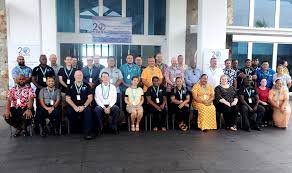Top Police leaders from twenty-eight Transnational Crime Units (TCU) across the Pacific are meeting in Samoa this week to address transnational crime such as drug trafficking, cyber-bullying and more.
The three-day conference was opened by Samoa Minister of Police & Prisons, Faualo Harry Schuster, who highlighted that his hope is for member countries to boost efforts in combating transnational crime in the future.
“One of the biggest concerns I have is going into the future and more of criminal activities will be conducted through the internet and I would like to think that we will be able to provide our law enforcers with the type of equipment and the knowledge to take on transnational crime as that is an area where this network is vital and essential for,” he said.
“We need to cooperate as countries and law enforcers to combat the efforts by criminals to gain proceeds from crime.”
The Minister stated that transnational crime and illicit drugs are a cross-cutting threat to development, security, and governance in the Pacific.
The conference theme is “Reconnections and Reflections” and enhances the networks motto of “Working together as one for a Safer Pacific,” for the PTCN which is a well-established and trusted network between law enforcement agencies acknowledging that no one agency can combat transnational crime alone.
The network utilises multi-agency collaboration as key to effectively combat transnational crime and uses a regional multi-agency approach which has been operating since 2002.
Over the last seventeen years, the PTCN has developed into a regional transnational crime capability.
Throughout the three days of the conference, police leaders are sharing strategic direction and guidance to the activities undertaken by or coordinated between members of the PTCN.
The Pacific Transnational Crime Coordination Centre is a multi-agency team based in Apia, Samoa.
Its purpose is to manage and coordinate criminal intelligence through cooperation and collaboration with TCUs and regional stakeholders. The four key roles functions include:
*Coordination: managing the collection and timely coordination and dissemination of transnational criminal intelligence
*Intelligence products: producing high quality intelligence products
*Collaboration: collaborating with law enforcement agencies and regional forums; and
*Capability development: enhancing the intelligence skills and capability of the PTCN.
There are 28 Transnational Crime Units (TCUs) in 20 member nations across the three Pacific regions of Micronesia, Melanesia and Polynesia and the role of a TCU is to identify and target transnational crime and share information by reporting to the PTCCC.
TCU key functions include:
*proactive criminal intelligence collection, analysis, target development and dissemination;
*leading on efforts to detect, dismantle and disrupt transnational crime impacting member countries and the region;
*liaising with local partners in relation to border control issues and investigations; and
*completing a country focussed transnational crime intelligence assessment each calendar year.
Member States with TCUs include: American Samoa, Australia, Commonwealth of Northern Mariana Islands, Cook Islands, Federated States of Micronesia, Fiji, Guam, Kiribati, Marshall Islands, Nauru, New Caledonia, New Zealand, Niue, Papua New Guinea, Palau, Samoa, Solomon Islands, Tonga, Tuvalu and Vanuatu.
SOURCE: TALAMUA ONLINE/PACNEWS














